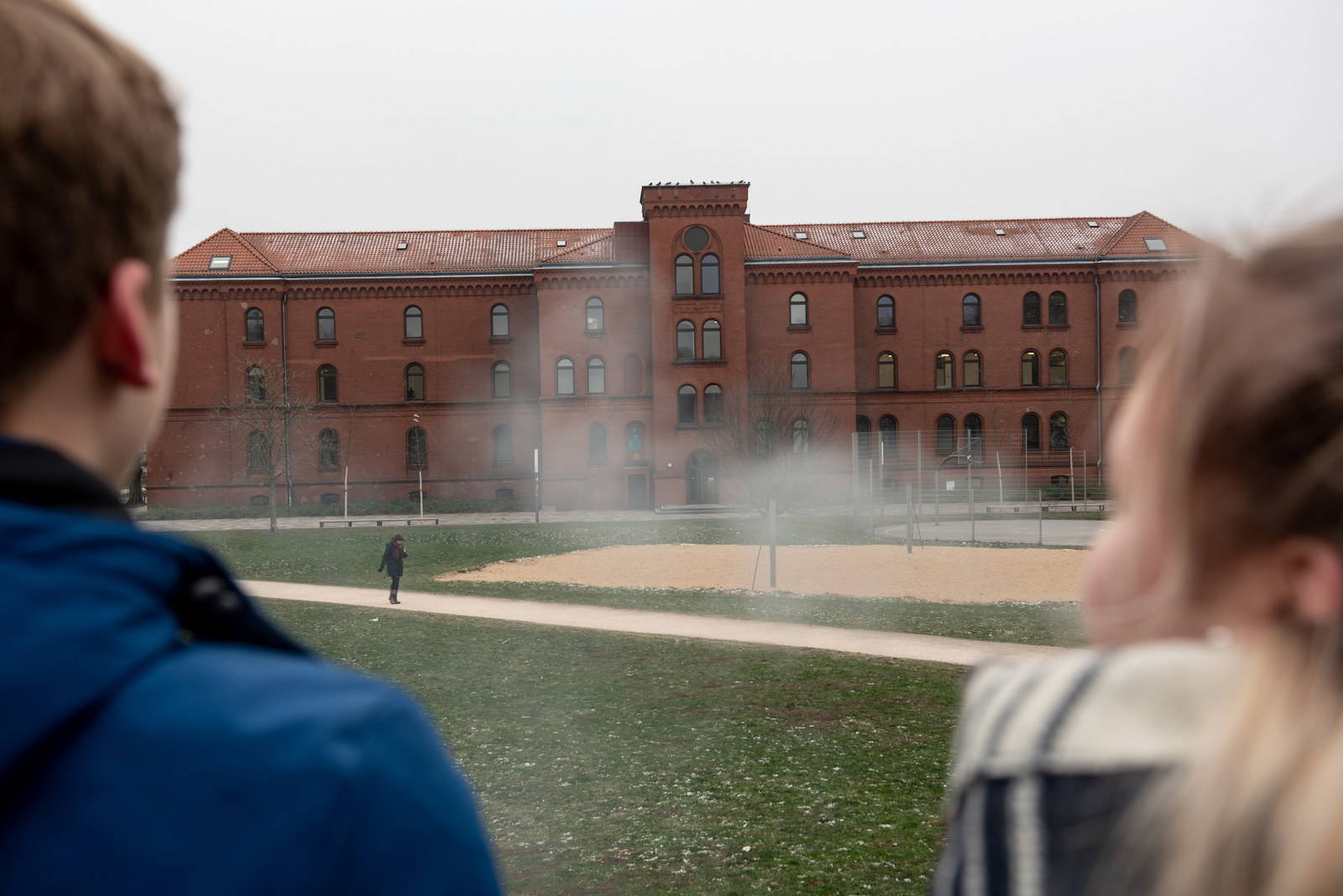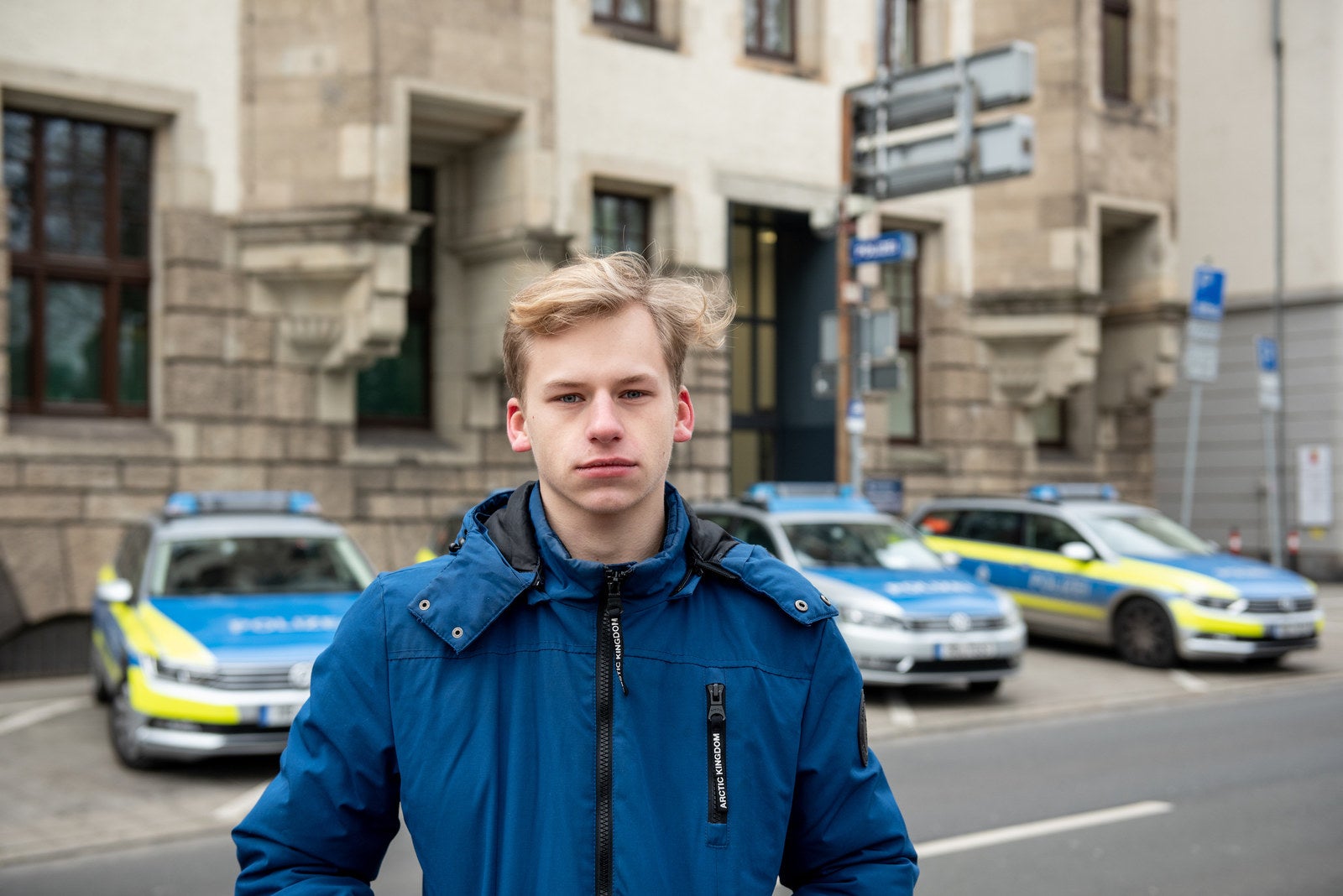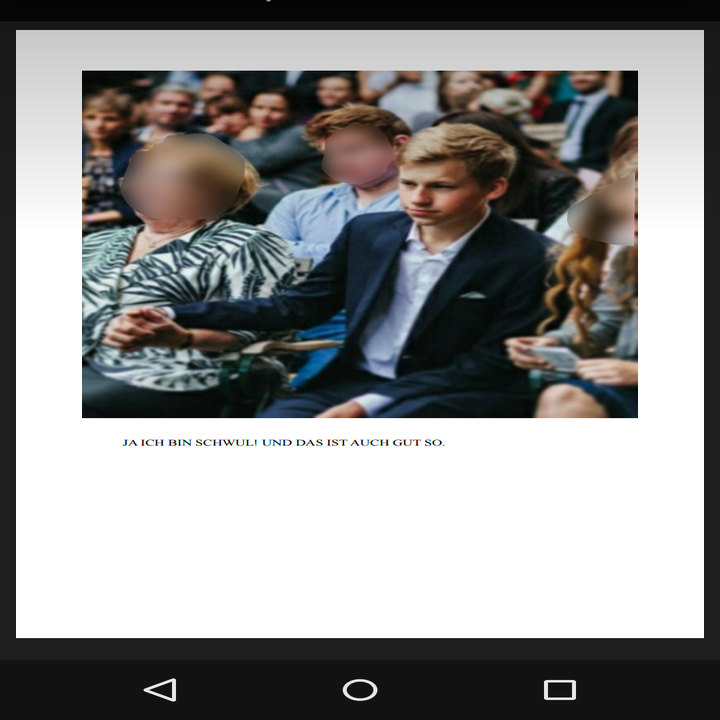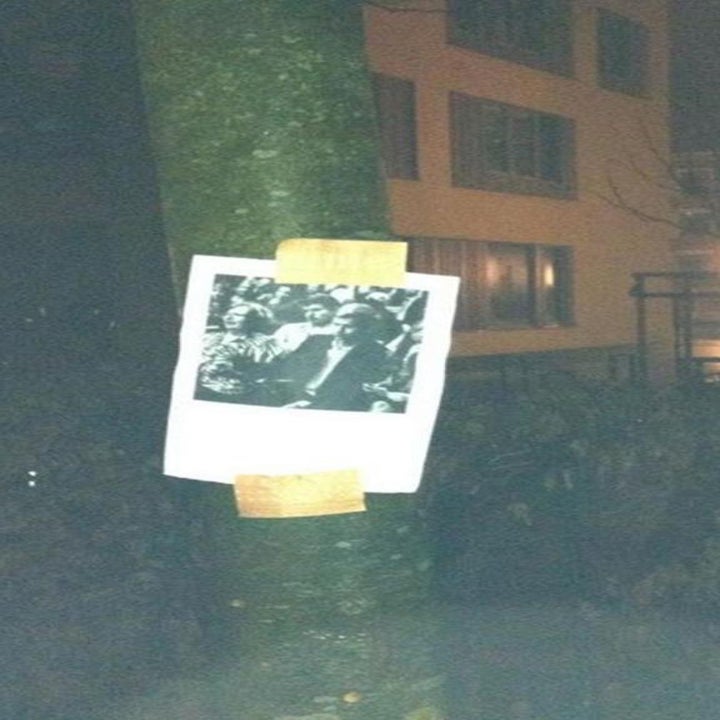In Germany, Someone Believes If You are German You Can’t Be Gay and If You Are You Should Die
On April 18, 2016, Max walked down the hall at his high school in Bremen, a midsize city in Northern Germany. He opened the glass door of a small office and saw a white cardboard box on the table addressed to him. The school’s director, a teacher, and a police officer were standing next to the box, Max remembered. Contained within it was a funeral wreath with black and dark red roses, as well as a white angel made of faux marble. Attached was a printed card: “We mourn the loss of Max O.”
The men in the room said things like “evidence” and “death threat,” but by that point, Max had already tuned out. In an interview with BuzzFeed News, Max recalled the thoughts that were racing through his mind: What is all this? What does it mean? What’s going on? What am I supposed to do? Back in class, he didn’t tell anyone what had just happened. He was 17 years old. Max — whose last name we are not publishing to avoid jeopardizing the ongoing proceedings and to prevent others from targeting him — is one of at least 10 people the District Attorney’s Office in Bremen presumes to have been stalked and harassed by the same perpetrator. The office is actively investigating at least four of the cases. All the victims are young gay men like Max.
The German Federal Ministry of the Interior registered 313 violent hate crimes against LGBT people in Germany in 2018. This actual figure is exponentially higher, however, because experts say these crimes are vastly underreported. For comparison, in England and Wales alone, more than 11,000 crimes based on sexual orientation were reported in 2017. Hatred toward LGBT people is also a part of everyday life in Germany, but it receives little attention in German politics and media.
This is one of the reasons why Max decided to make his case public. Last December, while at a village disco in the Allgäu, he again faced abuse because of his sexuality; it was one of the reasons he decided to come forward, using his own name and face, about everything that has happened to him. “I don’t want to hide anymore,” he said.
to cope with what Max said he experienced is difficult to determine. A 14-page report obtained by BuzzFeed News documents only a fraction of the attacks. Over a period spanning half a year, while he was still a minor, he received hundreds and hundreds of messages and threats, both online and offline. Dozens of fake profiles sprang up on Facebook featuring stolen pictures of Max, claiming to be him. He endured harassing phone calls, fraudulent sales made in his name, and death threats. Over several months, more and more people were swept up in the hateful ordeal, including Max’s family and friends, confidants, and even strangers.
The s
It took Max a while to understand that there was likely a single individual responsible, whose ultimate goal was to destroy his life. For weeks, no one — including the authorities — seemed to understand how dangerous the situation had become.
For months, the alleged perpetrator overwhelmed all of Max’s communication channels to the extent that they became unusable. And what at first seemed like a bad joke ended up poisoning Max’s social life. He became distrustful and suspected his harasser was waiting behind every corner.
For three years, Max has been waiting for the suspect to appear before a court. By now, he said, he’s positive he knows who it is: a man from his hometown who had intentionally targeted him for a harassment campaign. Even though the alleged perpetrator was always close by, no one was able to stop him. Now, it still isn’t clear when the man will stand trial. Max’s case exemplifies how difficult it is to escape an aggressive stalker, especially on the internet, how powerful anti-gay persecution in Germany still is, and how long it takes for its victims to finally see justice.
Before all this happened, Max was just another student, someone who didn’t really stand out. He’s a polite and cheerful person, he’s popular, he likes theater. “The biggest difference between me and the majority is that I’m gay,” he said.
Then, in January 2016, an acquaintance sent Max a message about an account on Facebook pretending to be him. Over the course of weeks and months, Max discovered more and more of these profiles — some of them pretending to be him, others pretending to be his friends or acquaintances. The suspect used these profiles to send Max countless messages threatening and insulting Max and his family, contacting teachers, and spreading rumors accusing Max of stealing. Strangers received death threats from Max’s phone number. The harasser also sold phony soccer tickets, cellphones, and festival tickets in Max’s name on eBay. Eventually, strangers would show up at Max’s house and school, demanding the goods Max had allegedly sold them.
At the time, Max wasn’t out to everyone in his life as gay. But the alleged perpetrator was flagrantly outing Max to his friends and family members, including his father and grandfather. He used a photo of Max photoshopped with text saying he was gay and posted it underneath family photos on Facebook.
“I am still angry that he outed me to my dad,” he said. “I never had the chance to tell him about it myself.“
Courtesy Max O., Obtained by BuzzFeed News
The posters of Max that were distributed in Bremen.
The alleged perpetrator also warned Max that he would print those photos and pin them up on Bremen’s streets. He was true to his word: In March, posters with Max’s photo showed up near his school in the city center with the caption, in all caps, “Ja ich bin schwul, und das ist auch gut so” (“Yes I am gay and that is a good thing”). Max found out about the posters before going to a party and asked a friend for help. Soon afterward, his friends joined forces and walked through the city together to take them down, some of them searching for the alleged perpetrator around the block. Dozens of classmates and friends showed up to help him, Max recalled. “It was an empowering moment.”
But that particular incident also led to a more sinister realization. “When we found the posters, I realized I was in more danger than I'd thought,” he said. “Before, it was just a man behind his computer.” But now the harassment had spilled into the physical world.
“You think you are immune because you have your friends who support you,” he said. “But then you realize that certain thoughts that you have toward strangers or acquaintances have been influenced by insecurity. Because during those months I was told, ‘You are worth nothing. You should die.’” At one point, the local newspaper received a request to print Max’s obituary
A Facebook screenshot of the obituary notice: “But now there is faith, love, hope — these three, but love is the greatest among them (1 Corinthians 13:13). Student Max. In love and gratitude.”
Many of the experiences have blurred together in Max’s memory. He can’t remember exactly how often he went to the police. BuzzFeed News has therefore compared the information he shared with his family members and friends, looked at dozens of screenshots, and contacted the relevant authorities. Since this is an ongoing case, we didn’t receive any answers to our multiple phones and email requests for comment. Not even Max’s lawyer is willing to answer any questions.
In response to a request we made to the school, a secretary wrote, “Unfortunately, I can only tell you that no one is willing or able to say anything about the case involving Max O.”
Several people involved in the case have told BuzzFeed News that the alleged perpetrator threatened to set off a bomb in a supermarket. He was apparently then caught and identified as Max’s alleged harasser. However, after a few hours in custody, he was reportedly released. But the details of the various statements differ, and no official authority is able or willing to confirm them.
BuzzFeed News has obtained the lengthy list of accusations on the charge sheet of the Bremen Municipal Court against the suspect. The charges include breach of public peace, abuse of emergency calls, defamation/libel, threats, robbery, extortion, and fraud.
“In retrospect, I’m amazed that no one else in our family has suffered any major harm,” said Max’s mother, who asked that her name be withheld. She also became a target of the attacks. The alleged perpetrator used a fake Facebook profile to spread misinformation about her, saying she has breast cancer. According to Max, threats were also made against his sister. Over the phone, a distorted voice told him, “I want to fuck her.”
The calls, messages, and cases of fraud took a toll on the entire family. “I felt like I was always somewhere trying to plug up holes,” his mother told BuzzFeed News. Eventually, she stopped answering the phone at all. Even now she feels exhausted from that time; she has insomnia and avoids crowds. What really worries her is that the suspect is still free. “I want to forgive him. The hate is poisoning my life,” she said. But “we’re still in the middle of it all.”
Max, however, continued to be active on Facebook throughout 2016, in order to document what happened to him and those around him. He wanted to find a solution on his own, and he wanted to protect the people around him from being harassed. But who was protecting Max?
There were weeks during which the alleged perpetrator wasn’t very active. Other days, he sent dozens of messages. During a particularly difficult phase in the spring of 2016, Max had a breakdown at his best friend’s house. It’s one of the few times that Max actually cried. As Max and his best friend recalled, he then shook himself and said something to the effect of, “This won’t do any good either.”
At the end of the day, he said, he felt alone.
In spring 2016, shortly after the incident with the posters, it all got to be too much for Max. He finally decided to report what was happening to him.
Max took several trips to a police station in downtown Bremen, an imposing building of large, sand-colored stone blocks. On multiple occasions, he tried to explain that his and other people’s cases were related, he told BuzzFeed News. (By this point, he had heard from friends and family members that he wasn’t the only one being harassed — one of his friends had also reported similar behavior to the police.) Max remembered having been to the station about three times. He said he was never contacted afterward. Instead, he remembered that the police told him to try going on Facebook less often or to not take what was happening to him too personally. Around May he received a phone call: The police were going to stop investigating his case — with no explanation why.
“He thought he would go there and get help, and he didn’t get any at all,” said his mother. In April 2016, Max’s father got involved and hired a private investigator.
Max described dealing with Facebook as similarly frustrating. He, his friends, and his family were reporting the fake accounts “nonstop,” he told BuzzFeed News. The company announced that it had deleted 1.3 billion fake profiles throughout 2018. But the alleged perpetrator was undeterred; he just kept creating new profiles over and over again.
According to criminal statistics, there were almost 20,000 stalking victims in Germany in 2017.
“When we found the posters, I realized I was in more danger than I'd thought.”
In Ge
In German, there are four specialized places that stalking victims and offenders can turn to, said Wolf Ortiz-Müller, a psychotherapist and head of the "Stop Stalking" counseling center in Berlin. “We lament this across the board. There are very few counseling centers, but [there are] a lot of people who need them, especially young people.”
It’s possible that Max’s harasser found his contact info on the queer youth network Du Bist Nicht Allein (“You Are Not Alone”), where he was active. Max said that on multiple occasions, he gave his number to people whom he met there or was in touch with. “It was dumb of me to feel safe there just because I was among other gay people,” Max said.
The local LGBT and counseling experts BuzzFeed News spoke with were already familiar with the case, thanks to earlier media and police reports. Max’s particular experience is unique because he didn’t know the suspect before the attacks, unlike in most stalking cases.
According to five different sources, the alleged perpetrator is in his early thirties and lives near Max’s old school. To avoid jeopardizing the ongoing investigation and putting the victims in distress again, BuzzFeed News did not confront him.
It’s unclear what’s motivating the harasser, but there are multiple theories. “One person in a group is singled out to represent others to show their belief that it’s appalling to live that way,” said Ortiz-Müller, who said Max and the other young men were being targeted because of their sexual orientation. “The alleged perpetrator wants to make an example of him. This boils down to the desire to destroy them all.”
“These attacks — especially in the case of gay people — often take place in spaces that are actually thought of as safe,” Bastian Finke, head of the anti-gay violence project Maneo, wrote in an email to BuzzFeed News. “Perpetrators deliberately invade social spaces believed to be safe, such as dating sites, cruising areas, or bars to flirt with [potential victims] and then blackmail or attack them.”

Wolfram Franke looked out the window for a long time, fiddling with his ring, saying nothing. The police officer works in a small police station in the middle of Max’s school. Max went to see him dozens of times in his office at the end of the hall. The two trust each other. When Max visited the office for the first time in several months earlier this year, Franke hugged him.
After not seeing any progress at the large police station in the city center, where it seemed like no one was working on his case, Franke became Max’s contact. And just like Max, through his own research and reporting, he believes he knows who’s responsible. Sometimes he sees this man walk by the police office window with a smile on his face.
Not even Franke knows when the proceedings will finally begin. “These things can take an eternity and I think that’s extremely sad,” he said. “I admire Max. Others would have been broken by all of this.”
Franke said that no matter how personally affected he is by the case, in the end, his reports on Max will just be another part of a long paper trail. According to information obtained by BuzzFeed News, the alleged perpetrator was arrested by police in July 2016 after making a bomb threat. He was released, but afterward, the harassment campaign against Max mostly stopped.
Today, Max is 20 years old and applying to a university abroad. He still uses Facebook and WhatsApp to talk to his friends and family. But his social media channels also remind him of a past he wants to put behind him. “The places where it all happened are still there,” he said.
“Knowing that someone is out there potentially pushing young gay people to kill themselves and that this is still going on in the 21st century makes you question our society.”
On a winter day earlier this year, when it seemed it was about to snow at any moment, Max was taking a walk through downtown Bremen with his best friend. A message on the entrance of a fancy clothing store read, “If you are racist, sexist, homophobic, or an asshole … don’t come in.” In a café a few buildings down, Max told his story again.
Only now does Max realize how bad his experience actually was. In his conversations with BuzzFeed News, he kept naming the mistakes he feels he had made: He should have gone to the police earlier. He shouldn’t have thought he could handle it all by himself. He shouldn’t have isolated himself.
For a few weeks, he has been going to a stalking counseling center for emotional support and legal advice.
Every once in a while, he still gets messages on Instagram. Max thinks he recognizes the alleged perpetrator based on the way he writes. “You develop a sense for it,” he said. “I want him to stop. Knowing that someone is out there potentially pushing young gay people to kill themselves and that this is still going on in the 21st century makes you question our society.”
The spokesperson for the municipal court of Bremen was unable to comment on when there will be a trial, and if it will be public. Max himself has repeatedly said that not even he knows where things will go from here. So he is waiting. Waiting until he can finally put it all behind him.
Sometimes he imagines how he would behave in the courtroom: vulnerable or strong? “I want to show him what he did,” said Max. “But I also want to show him that he didn’t achieve his goal.” Max is still here — surviving.



Comments